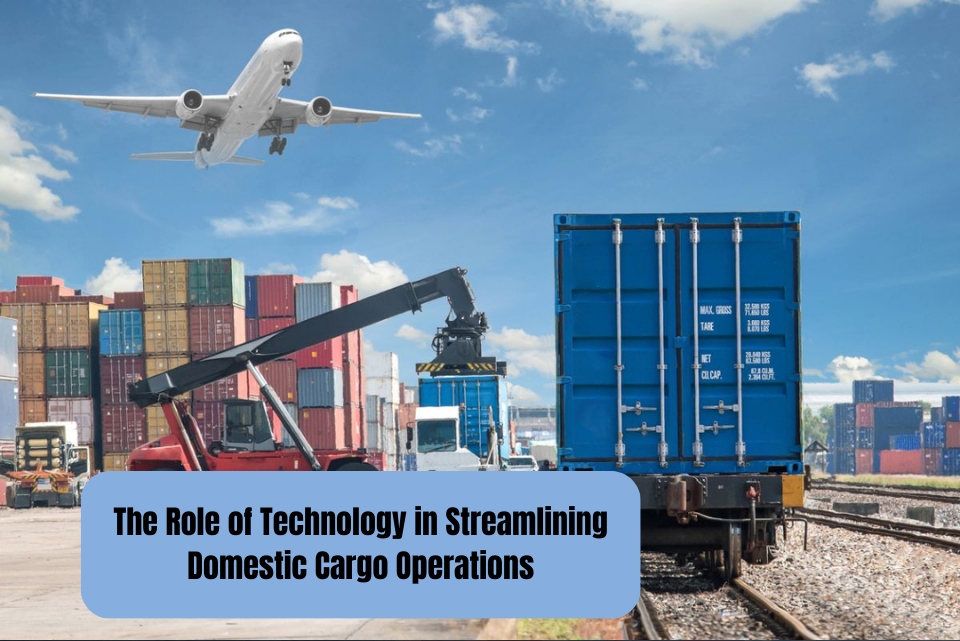In today’s fast-paced world, the efficient movement of goods is essential for the smooth functioning of economies and businesses. The logistics industry plays a crucial role in ensuring that domestic cargo operations run seamlessly. In recent years, technology has been a game-changer in streamlining these operations. This blog explores how technology is revolutionizing domestic cargo operations, making them more efficient, cost-effective, and environmentally friendly.
Real-time Tracking and Visibility
One of the most significant advancements in domestic cargo operations is the ability to track shipments in real-time. With the advent of GPS and IoT (Internet of Things) technology, logistics companies can provide customers with accurate and up-to-the-minute information about the location and status of their cargo. This level of transparency not only enhances customer satisfaction but also helps in preventing theft and reducing the risk of cargo damage.
Automation and Robotics
Automation and robotics have transformed various aspects of domestic cargo operations. Automated warehouses and distribution centers use robots to manage inventory, pick and pack orders, and load trucks. This not only reduces labor costs but also minimizes errors and increases the speed and accuracy of cargo handling. Drones and autonomous vehicles are also being explored for last-mile delivery, further enhancing efficiency.
Digital Documentation and Paperless Transactions
Traditionally, domestic cargo operations involved a lot of paperwork, from invoices to bills of lading. Technology has allowed for the digitization of these documents, reducing the risk of errors, speeding up processes, and promoting sustainability by reducing paper usage. Electronic documentation also facilitates quicker customs clearance and simplifies compliance with regulatory requirements.
Data Analytics and Predictive Maintenance
Data analytics has become a powerful tool in optimizing domestic cargo operations. By collecting and analyzing data from various sources, including sensors on cargo containers and vehicles, logistics companies can make informed decisions. Predictive maintenance algorithms help identify potential issues with vehicles or equipment, allowing for timely maintenance and reducing downtime. Moreover, data analytics can optimize route planning, ensuring that cargo reaches its destination efficiently.
Blockchain for Transparency and Security
Blockchain technology is gaining traction in the logistics industry due to its ability to provide transparency and security in transactions. It allows all stakeholders, from shippers to carriers and customs authorities, to access a shared ledger of transactions. This transparency reduces disputes, fraud, and delays in cargo operations. Smart contracts, powered by blockchain, can also automate and enforce contractual agreements, ensuring that payments are made promptly when specific conditions are met.
Sustainable Practices and Eco-friendly Solutions
Technology is also playing a crucial role in making domestic cargo operations more environmentally friendly. Electric and hybrid vehicles are becoming more common in logistics fleets, reducing greenhouse gas emissions. Additionally, route optimization algorithms help minimize fuel consumption. Cargo tracking technology enables better inventory management, reducing waste and spoilage.
Customer Engagement and Experience
Technology has transformed how logistics companies engage with their customers. Mobile apps and online platforms allow customers to track their shipments, make inquiries, and provide feedback in real-time. This enhanced customer experience not only fosters loyalty but also provides valuable insights for improving operations.
Artificial Intelligence for Demand Forecasting
Artificial intelligence (AI) is being used to enhance demand forecasting in the logistics industry. By analyzing historical data and taking into account various factors such as weather, holidays, and market trends, AI algorithms can predict demand more accurately. This helps logistics companies optimize inventory levels, reduce stockouts, and minimize excess inventory costs.
Augmented Reality for Training and Maintenance
Augmented reality (AR) is being employed for training and maintenance purposes in domestic cargo operations. Technicians can use AR glasses to access real-time information, schematics, and step-by-step instructions while performing maintenance tasks. This reduces the need for extensive training and speeds up maintenance processes.
Regulatory Compliance and Safety
Technology aids in ensuring regulatory compliance and safety in domestic cargo operations. Sensors can monitor temperature, humidity, and other environmental conditions in cargo containers to ensure compliance with regulations for transporting sensitive goods, such as pharmaceuticals or food products. Additionally, technology-enabled safety measures, such as driver monitoring systems and collision avoidance systems, reduce the risk of accidents.
In conclusion, technology is playing an indispensable role in streamlining domestic cargo operations. From real-time tracking to automation, from blockchain to sustainable practices, these technological advancements are enhancing efficiency, reducing costs, and improving the overall customer experience. As technology continues to evolve, we can expect further innovations that will make domestic cargo operations even more efficient and environmentally friendly. Embracing these technological advancements is not just a choice; it’s a necessity for staying competitive in the ever-evolving logistics industry.



